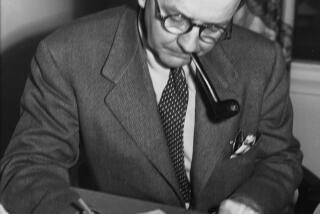Rod McKuen dies at 81; poet/songwriter had meteoric rise and fall
- Share via
Rod McKuen, a wildly successful poet and songwriter in the late 1960s and 1970s — with massive book sales, a No. 1 hit song, concerts around the world, frequent TV appearances and an entire album of his works recorded by Frank Sinatra — slipped into obscurity almost as quickly as he came to fame.
By the 2000s, McKuen was not surprised that people thought he had died.
“I’ve gotten mail addressed to the Estate of Rod McKuen,” he told the Chicago Tribune in 2001.
McKuen, 81, whose gentle verses on love and loss resonated at a time of flower children and incense burning, died Thursday at a Beverly Hills rehabilitation center. The cause was respiratory arrest after suffering from pneumonia, said his longtime friend and producer Jim Pierson.
McKuen was twice nominated for an Oscar — in 1970 for the song “Jean” from the Maggie Smith film “The Prime of Miss Jean Brodie,” and in 1971 for original song score of the Peanuts movie “A Boy Named Charlie Brown.”
His song “Seasons in the Sun,” to music by Jacques Brel, hit the top of the charts in 1974. Though recorded by McKuen, the hit version was by Canadian singer Terry Jacks.
But McKuen’s most improbable success was as a poet. He sold millions of copies of his poetry books, including the 1966 collection “Stanyan Street and Other Sorrows,” 1967’s “Listen to the Warm” and 1970’s “Caught in the Quiet.”
In one year, he had three bestsellers on Publisher’s Weekly charts, which was a first not only for a poet, but for any author.
As popular as the books were, critics often scorched his poetry. Newsweek called him the “king of kitsch” in 1969, and the moniker stuck.
“Listen to the Warm” gave them ammunition:
“It’s nice sometimes
to open up the heart a little
and let some hurt come in.
It proves you’re still alive.”
But the pans were not unanimous. Los Angeles Times reviewer Robert Kirsch said that the 1968 collection “Lonesome Cities” showed McKuen “capable of rendering awareness into perceptions of small but haunting truths.”
Kirsch cited a section of a poem:
I came through the clothesline maze of childhood in basketball shoes.
Up from the cracked cement of sidewalks.
Long hair blowing in the breeze
From barber-college haircuts.
McKuen was born April 29, 1933, in Oakland in a charity hospital. His mother was a taxi dancer; his father abandoned them. “I had the advantage of being born a bastard,” he said in a 1974 Times interview. “It takes some people all their lives to become one.”
As a boy, McKuen suffered physical abuse from his stepfather. “My stepfather drank a lot,” he said in a 2002 San Francisco Chronicle interview. “He liked using me as a punching bag, so I ended up running away.” He dropped out of school, but was granted a high school degree at 41 in 1974 when credits earned from his Army experience were applied.
At 15 he was a disc jockey on an Oakland radio station, where another employee, Phyllis Diller, helped him land a chance to sing at a San Francisco nightclub. His first album, “Beatsville,” in 1959 focused on the Beatnik movement. It even included jokes, such as, “Did you hear about the wealthy beatnik who hired a maid to keep his pad dirty?”
After his career took off, his performances — for which he was usually clad in sneakers, jeans and a turtleneck or sweater — featured his poems and songs delivered in his raspy voice.
He did not fit in with the politically attuned performers of the time, and that was fine with him. “Bobby Dylan is protesting and I’m not,” he told The Times in 1967. “I’m saying, ‘This is the way it is.’ We’ve gotta learn to live with each other.”
The 1969 Sinatra album, “A Man Alone: The Words and Music of McKuen” featured Sinatra reciting McKuen’s verse, as well as singing his songs. One song on the album, “Love’s Been Good to Me,” was also covered by Johnny Cash, who recorded a version of it shortly before he died.
At the height of his career, McKuen was doing more than 250 concerts a year, plus TV appearances — he was a guest several times on “The Tonight Show with Johnny Carson.” But in 1981, he pulled the plug. “I was tired. I peaked,” he told the Chicago Tribune. “I left when I was on top.”
He retreated to his 15,000-square-foot home in Beverly Hills, with three walls taken up with his gold records. Depression set in, and he made only occasional public appearances until the early 2000s, when he attempted a comeback that mostly fizzled.
In his 1999 poem, “Age is Better,” he seemed to reach some peace with aging.
“I discovered I was older, even old. There was
No sudden melancholy or regret, and yet
Some sadness in the wonder that it happened
When I wasn’t watching ...
Survivors include his half-brother, Edward McKuen Habib.
Twitter: @davidcolker
More to Read
Start your day right
Sign up for Essential California for the L.A. Times biggest news, features and recommendations in your inbox six days a week.
You may occasionally receive promotional content from the Los Angeles Times.







